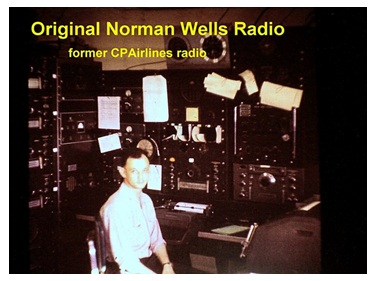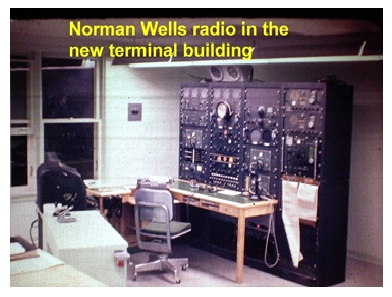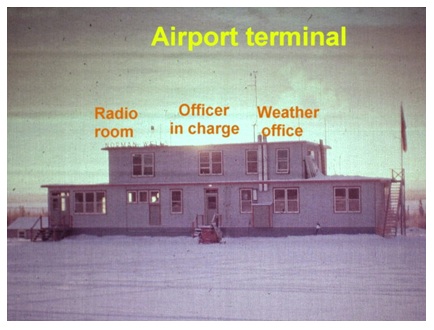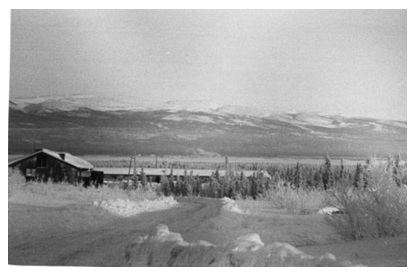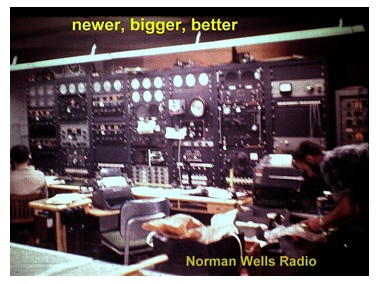
|
1958-1959 Norman Wells Radio Souvenirs of Norman Wells Radio from Milton Watts
Norman Wells’s community consisted of a large number of IOL personnel, some in barracks, and some in houses. CPA staff in their own housing. NWT and Yukon radio system (RCCS) had a large station and staff in their own housing. DOT had an upper air station in their own housing. DOT airport staff had some in houses and some in the barracks. Surface weather staff and radio staff were all in barracks. IOL provided barracks and messing for all DOT single employees.
I arrived there on a gloomy wet August day. The DOT radio was the old CPA radio, with the same equipment and about the same duties as when CPA ran it. A very small office upstairs over an old nose hanger, with the entrance through the CPA office. Water had to be brought from town in a rusty old can. Plumbing was outside. Staff morale was very poor. My first priority was to bring things up to a more normal DOT standard. A proper water cooler was ordered, then tools and publications. All of my requisitions brought a letter from Don Dewar. “Thanks for taking an interest in the station, please be patient we will get everything to you as quick as possible”. One major problem here was that the night shift operator had nothing to do at night except a rare message received. The NDB belonged to RCCS, hence no monitoring, no voice capability no weather broadcasts. There was a weather office in town at the RCCS office, no weather observations by the RO. None of the RO’s had ever had an aircraft call at night.
The CPA receiving antennae were in rather poor condition. Canadian Marconi had a station here during the DewLine airlift. The antennae were still up and appeared to be in good condition. I pulled the coax feeders up into our station and connected to the receivers, significantly improving our receiving capabilities. A very small building nearby was the transmitter site. Two AT3 transmitters and a 500W Lf transmitter, a RCA237B I believe. Several years later I heard that one of the AT3 belonged to CPA and the other to DOT. CPA wanted there’s back which meant shipping in and then out for two AT3. The problem was resolved when an ingenious DOT tech. smuggled a DOT transmitter in and smuggled the CPA transmitter out in his baggage. How do you do that? Switch nameplates.
A new two storey flat roof terminal building was nearing final completion. Our new radio office was huge, well lit. OIC office, and a new weather office, indicating the weather staff would be moving from the RCCS station. The most wonderful part – indoor plumbing. Austin Smith, Lofty Harris, Matt Franchuck and his steel crew arrived to move into the new building. This included relocating our transmitters to the RCCS transmitter site some distance out of town. That, together with remote receivers and new antennas, greatly improved our communications. The weather staff did not relocate till some months later.
The distant weather office made for some embarrassing moments. Our only communication to town was a teletype link to the RCCS office and a phone that connected to IOL’s office. The phone was of no use when the office was closed. When the teletype link went down we had no access to local weather reports. If a flight should ask for weather, we could provide any from other stations, but not Norman Wells. The lack of communication to town presented other problems. When an aircraft arrived during off hours we would tell them to fly low over the town to alert the refueler. One DEW line flight had a problem getting fuel even with the usual signal. His remark was that they would know the next time he wanted fuel. They did! He flew at extremely low level across the river, had to climb the bank and almost stood the aircraft on its tail over the town in the process. The move into our new offices was great for morale, but our duties, or lack of duties, did not change. When the weather staff moved in we did have company and access to our local weather.
Norman Wells barracks block were all old wartime buildings but kept very warm in winter with lots of surplus steam from the refinery. IOL had hired the wives of some of their staff as cleaners, whose job it was to keep the barracks clean. One of the cleaners posted a sign in the washroom. (Please do not throw cigarette butts in the urinal. They are very difficult to retrieve and almost impossible to smoke). There was a large recreation hall, where occasional dances were held and weekly shows. We had a Jeep pickup truck for the station vehicle to run to the airport about two miles away. Since we did not have a garage, winter cold presented a problem. At first we were allowed to plug the vehicle in, later IOL objected due to shortage of power. We had no alternative, in the deep cold spells; the Jeep was left running during the day but could be plugged in after midnight.
Meals provided by IOL, were reasonable quality and quantity, but you knew the day of the week by what was on for supper. The only variation was when a holiday came along. Thanksgiving Day I decided to let the evening shift operator enjoy the turkey supper and I would fill in for him. I enjoy turkey sandwiches, so that would do nicely. IOL had staff working shifts as well and they provided brown bag meals for anyone on shift. I walked into the kitchen grabbed a brown bag off the shelf and proceeded to the airport. Supper time came and my favorite turkey sandwich, Whaaaat these are bologna sandwiches. I can’t complain it’s the same sandwich IOL gave to their own employees.
A few miles across the mighty Mackenzie River was Camp Canol. The end of the Canol pipe line built and abandoned by the US military. One bitter cold winter day the AMF was driving over to the site, so I went along for the ride. A huge camp with a beautiful setting. The picture shows two of the many many buildings. The smoke, centre of the picture, on the distant shore is Norman Wells. The snow was too deep to get into many buildings, but we did enter two. Wondering what one was, and then realized it was a huge kitchen. Another building was a warehouse and still had a large stack of truck steering wheels. Could not imagine why they would need so many, but it did get us wondering what else was hidden in the snow.
The Aeradio station had no telephone connection to the OIC in town or to any other DOT site. The Airport Maintenance foreman lived in a house adjacent to the sigs station. Early one evening one of the RCCS operators told him the Aeradio operator at the airport was sick and needed help. The AMF came to get me and we drove to the airport. I stayed at the airport while the two others drove back to town. IOL had a small two bed hospital complete with two nurses and a doctor. A little later I got a call from the Doctor wanting to know if there were any aircraft available for a medical evacuation. None available but I would certainly do what I could to get one, what is the problem. Gene, the sick operator needed an emergency appendectomy. Not necessary the doctor said they could handle it. Gene was in the hospital for several days and had a successful recovery. On one visit with him I dropped off a book I had been reading and enjoyed very much. Later that evening one of the nurses chastised me for giving Gene the book. Why? The book was titled “We Die Alone”.
I was asked to see the IOL manager one day. He wanted to arrange a radio schedule with an exploration party they had in the field. I told him we could not do that. He should talk to the RCCS. That was their type of business. They had already turned him down and he did need the radio link. Could I not get permission to do this? I could try, but I doubt it would be approved. Then he said it would only be for emergency purposes with the field party. Well that might be okay, but what frequency would you use. All of our P/P frequencies were CW. They intended to use an air/ground frequency; in fact it would be from the helicopter that would be with the party. That put a whole new light on it. Of course an aircraft can call us anytime and particularly if it is an emergency. A week or so later while I was on shift, the helicopter called reporting all was okay. Duly noted, logged and forgotten. A few days later the IOL manager, somewhat annoyed, asked why I hadn’t told them about the call. “I wasn’t asked to tell you and since it was not an emergency I saw no need for it.
As was usual in isolated communities, I was occasionally asked if I could “fix a radio”. One of the local people was an avid SWL. He brought me his radio one day, could I fix it? I pulled all the tubes and checked them. All okay. Started checking voltages, All okay. Left it for the day. The next day the owner came to see how I was doing, prior to leaving he casually mentioned that there had been a lot of loose screws inside he had tightened them all down. Complete realignment was the next job. Sometime later it was back. You didn’t tighten anything? No. Okay, pull the tubes, check all okay. Plugging them back in, hey wait a minute what’s this tube it doesn’t belong here and it’s a government tube. Where did you get this and why? He got it from the army, they didn’t have the exact number but he thought this was close enough. The end of my radio servicing in Norman Wells.
Late in the winter a competition was held for Regional Office Technician. This was the first time it was open to the general public. I believe the idea was to make it available to the RCCS technicians who would be looking for work when we took over the stations. I won the competition. A few days after I received word of my promotion I received a letter from the Civil Service office saying that I was not qualified to be a technician. This was not new to me. Several months after I joined the DOT and was a working in Smith River as an RO, I received the same sort of letter saying I would not be hired as I was not qualified.
A few weeks later my replacement arrived and I was on my way to Edmonton Regional Office.
|
|
Links - Liens
|






